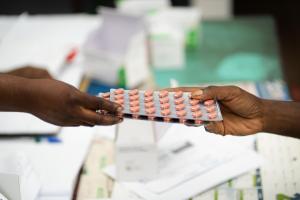Combined HIV-TB testing, care curbing infection and mortality in Niger
Niamey – “Six months ago I went for check-up … I thought it was something simple like flu, but my illness was much more serious,” says Ali, 47, from Talladje district of Niger’s capital Niamey. “I was diagnosed with tuberculosis and HIV.”
Tuberculosis (TB) is one of the world's deadliest infectious diseases, taking the lives of about 1.5 million people annually. It is also the leading cause of death among people living with HIV (PLHIV). In Niger, tuberculosis prevalence among PLHIV was estimated at nearly 4% in 2019, with a 21% death rate, according to National Tuberculosis Control Programme (PNLT) statistics.
World Health Organization (WHO) estimates that PLHIV are at 20 to 35 times higher risk for developing TB. To address this TB-HIV co-infection threat, WHO recommends, among other measures, that dual care is provided at one-stop units within health facilities.
This approach reduces delays in initiating antiretroviral treatment (ARV), improves prognosis, limits the need to visit several facilities to receive care, and curbs treatment drop-out rates.
In 2020, with support from WHO, Niger launched a pilot programme to establish the first 65 one-stop units. The Organization also helped mobilize partners such as the Global Fund to Fight AIDS, Tuberculosis and Malaria to finance the expansion of this initiative.
With financial support from the Global Fund, nearly 197 TB screening and treatment centres have since been transformed into one-stop units for the management of TB-HIV co-infection. By the end of 2023, Niger had one-stop TB-HIV units in 262 of all its 291 testing and treatment centres.
“This has really helped improve our impact. We recorded a 50% increase in the proportion of TB-HIV co-infected patients who were screened and treated (between 2020 and 2022). We have significantly reduced delays in patients starting ARV treatment,” says Dr Oumarou Safi, TB/HIV focal point at the National Tuberculosis Control Programme.
Within three years of implementing the strategy, almost 90% of health centres have been transformed into one-stop units and are fully operational. Treatment of TB-HIV co-infection has risen from 3% to 89%, and mortality rates have decreased from 21% in 2019, to 14% in 2022.
Together, WHO and the Global Fund have supported the training of more than 400 health workers in HIV counselling techniques, testing and dispensing of ARVs. Mariama Issoufou, who heads the Talladjé health centre, was among those who benefited from the training in February 2023. “In the past, we didn't take on HIV cases due to lack of skills and resources. Now, we take care of TB-HIV co-infection,” she explains.
In the seven months since the implementation of the one-stop units approach, the Talladjé health centre has registered 82 TB patients, three of whom tested positive for HIV, and began ARV treatment.
“With this new approach, we can take care of people with HIV. Before, we referred them to ARV prescribing centres. Now we take care of them directly, free of charge. There's also the added benefit of privacy and ease of access,” Issoufou says.
Niger does not intend to stop there. “We hope to further reduce the mortality rate to the accepted 5%,” says Dr Mariama Baissa, TB-HIV programme manager at the WHO country office in Niger.
The country also plans to mobilize additional resources to accelerate its response to this dual health threat. Awareness-raising, access to quality care and regular patient follow-up remain essential pillars in preventing the spread of TB-HIV co-infection and improving overall health in Niger.
“After testing positive for TB and HIV, I'm receiving care right here in the health centre. My follow-ups are conducted by the head of the centre, who gave me a nice welcome. I receive all the medicines free of charge,” Ali says.
“Since I started treatment six months ago, my health has improved a lot. I no longer have any symptoms. I eat normally and I feel great.”
